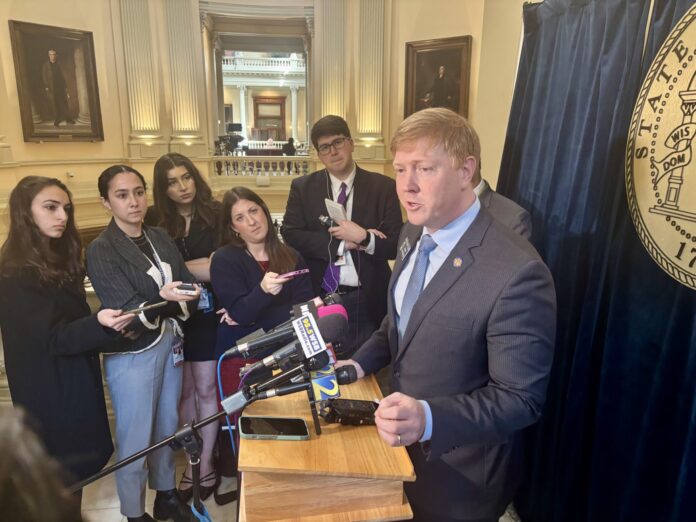
(Georgia Recorder) — The Georgia Senate passed a bill Thursday that would allow local government employees and officials in so-called sanctuary cities to be held civilly liable for crimes committed by immigrants without permanent legal status.
The sponsor of Senate Bill 21, Republican Sen. Blake Tillery of Vidalia, said the new law would stiffen penalties for local officials and government employees who fail to follow state and federal laws, which requires them to report to U.S. Immigration and Customs Enforcement individuals suspected of being in the country illegally.
Several refugee agencies in Georgia have joined forces to oppose “fearful” laws targeting Latinos and other immigrants, arguing that legislation like SB 21 further emboldens the mass deportation policies enacted since Republican President Donald Trump took office in January.
Two Democrats, Sen. David Lucas of Macon and Sen. Freddie Powell Sims of Dawson, voted in favor of the bill, which passed 33-18. The measure now moves to the House.
The proposal waives sovereign immunity for local governments that adopt sanctuary policies, which have been illegal in Georgia since 2009. Sovereign immunity legally protects governments from being sued without their consent.
“Today, the Senate took a significant step toward increasing security for our local communities and all of Georgia,” Lt. Governor Burt Jones said. “If you enter our country illegally, you are breaking the law, period. While President Donald Trump fights on the national level to secure our borders and keep illegal immigrants off the streets, we will do the same in Georgia.
“As part of our ongoing commitment and priority to protect our citizens, we are taking a stand against those who attempt to implement sanctuary policies that violate the law and harbor criminals,” the Butts County Republican said.
The legislation is a follow-up to a 2024 law, which places local governments at risk of losing state funding if they fail to enforce federal immigration laws. The new law also states that police officers and local officials could be charged with misdemeanors if they fail to comply.
This year, Trump issued a series of immigration orders that increased border security and the number of raids conducted by federal immigration authorities. Trump promptly signed the Laken Riley Act, named for a Georgia nursing student slain on the University of Georgia campus by a Venezuelan national who immigration authorities say entered the country illegally.
“We have seen a politicization of the law, and it has become popular at times to take positions to say that while this may be the law, ‘I’m not going to enforce it,’” Tillery said. “That’s become such a hot button issue as it relates to immigration that I think our state has to take a different position.”
Several Senate Democrats spoke out in opposition to a bill they said doesn’t address the issues facing a number of sheriff’s offices dealing with overcrowding and understaffing at jails, placing them in a bind of having to indefinitely detain people accused of misdemeanor crimes while other inmates facing more serious charges could be released from custody.
Since Trump was sworn in on Jan. 20, raids led by Immigration and Customs Enforcement are on the rise, with more than 8,200 arrests nationally between Jan. 22 and Jan. 31.
Sen. Elena Parent, an Atlanta Democrat, said the Trump administration’s mass deportation policy has already resulted in over 460 detainees being released from custody because of overcrowding at detention facilities. The released individuals are required to be monitored and to attend court hearings concerning their immigration status.
Tillery said his bill is intended to create more financial risks for local governments that disobey immigration laws.
“My assertion seems to be that if we have illegal people here in this country committing crimes, if we get them out of our prison system and out of our state and out of our country, then we will have extra space for those that we really need to hold,” Tillery said.
Gwinnett County Democratic Sen. Nabilah Islam Parkes criticized Republican lawmakers for supporting Republican Gov. Brian Kemp’s top priority of the session by limiting civil lawsuit damages awarded to plaintiffs while at the same time removing sovereign immunity protections from local governments.
Islam Parkes said it’s hypocritical for her Republican colleagues to push for so-called tort reform while also advocating for a “right to sue” measure like SB 21, which will put local officials and educators in the potential crosshairs of lawsuits.
“Do you ask a 7-year-old where they were born to rule out kids based on their last name or the language they speak at home, because that’s what this bill opens the door to,” she said. “It forces educators to choose between following federal law, which protects all students’ right to an education, and risking a lawsuit from an anti-immigrant extremist who would rather drag a teacher to court than see a child succeed.”
Over the past few years, Tillery said there were too many instances of ICE not picking up people detained in local jails after being suspected of being noncitizens. He dismissed arguments that Georgia teachers will be forced to risk their jobs based on immigration law.
“We’re not having third graders creating rapes and murders in our state,” he said. “I think that’s a red herring. Remember, there’s got to be a harm for you to have a waiver of sovereign immunity. You’re responsible for the harm that’s caused because you are not following law.”
Thursday also happened to be the day for the New Americans Celebration at the state Capitol, which cheers the immigrants and refugees who have made Georgia their home. As senators debated the bill, a large group of advocates gathered on the steps inside the Capitol. Several Democratic lawmakers slipped away from the Senate chamber to speak to the group.
“There is some irony here,” said Sen. Jason Esteves, an Atlanta Democrat who voted against the bill. “The irony is the bill is an anti-immigrant bill, and at a time when we should be celebrating the accomplishments of our refugee and immigrant community, in the Senate chamber, they are debating whether to take away sovereign immunity based on immigration laws.
“It is part of the politics that we’ve seen at the national level that try to demonize our immigrant community,” Esteves said.
Georgia Recorder Deputy Editor Jill Nolin contributed to this report.







